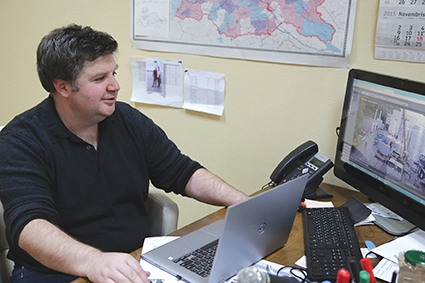Swiss Business in Georgia
The possibility of free trade with Europe has raised high hopes in Georgia. Since the signing of the free trade agreement with the EFTA in June 2016 in Berne, these hopes have focused on Switzerland in particular, one of the four EFTA member countries. “The agreement opens a lot of opportunities, especially in the field of agribusiness,” says Mikheil Mikeladze, President of the Georgian-Swiss Business Association, an organization which aims to promote economic relations between the two countries.
In fact, there's a lot to promote when it comes to business between the two countries. In 2015, the volume traded was only 39 million Swiss Francs ($39 mln), even less than 2014, according to Swiss statistics. Most of this was made up of Swiss products being exported to Georgia, the majority pharmaceutical and watch-making parts. Only 15% of the total bilateral volume consisted of Georgian exports, mostly textiles and agricultural products.
But the EFTA agreement alone won't help Georgia to change this trade imbalance when it enters into force, probably in late 2017. “To export products to European countries, Georgia needs far-reaching reforms to meet the high Western standards,” says the Swiss Ambassador to Georgia, Lukas Beglinger. “Moreover the trade of agricultural products is not fully liberalized in the agreement.”
“Normally, a free trade agreement works for the profit of the country with higher developed products, in this case Switzerland,” says Mikheil Svimonishvili, Margebeli Holding and former Minister of Agriculture. “Today, Swiss chocolate is 12% more expensive than the same product from Germany because of taxation. This will change with the agreement.” And it could increase imports from Switzerland to Georgia.
With $175 million in 2015, Swiss investments made up only 1.3% of all foreign investments in Georgia. However, this is set to change and there are already a number of large-scale investments in the field of agricultural production and food processing.
The Margebeli Holding, with the prestigious Nabeghlavi mineral water, is a Swiss-Georgian cooperation existing since 1997 [see page 7]; the meat producer and processor Blauenstein was founded by Swiss businessman Max Blauenstein from Geneva; and the hazelnut trade firm Anka Fair Trade is run by a Turkish-Swiss citizen. These investments are not only made with huge returns in mind, but at least partly also for reasons of emotional attachment to the small Caucasian country.
And Georgia is indeed a small market. That's why the country as such is no priority market either for Swiss companies nor for the Swiss organization promoting exports.
Additionally, Ambassador Beglinger sees problems in terms of legal security. “The justice system doesn't always work professionally here,” he says. But in his opinion the main challenge is education and skills. Svimonishvili agrees, “Too many young people are graduating university in Georgia,” he says. “This lowers the academic standard, while, on the other hand, there is a severe lack of skilled workers.” That the government has announced reforms in this sector is welcome news.
Yet, the regulatory framework in Georgia is quite investor friendly, and bureaucracy and corruption are relatively low. Added to this that the tax framework has become even more attractive from this month, with the so called “Estonian Model” making re-invested earnings tax-free.
Tourism and manufacturing could be interesting sectors for Swiss companies to invest in.
“These are the sectors the government wants to boost,” says the Georgian-Swiss Business Association’s Mikeladze. “For example, the State offers loans for industrial production on good conditions.”
Ambassador Beglinger sees logistics and infrastructure as potential fields for Swiss investment, helped by the Georgian government’s desire to establish the country as an economic hub in the region thanks to free trade agreements with European countries as well as with most CIS countries and China.
“But an attractive framework and economic potential is not enough,” says Mikheil Svimonishvili. “Swiss companies don't come to Georgia just because: they need to be attracted and convinced. Foreign investors should be helped to understand the mentality in Georgia,” he says. “That's the only way to get a big company from abroad to invest in this small country.”
Lukas Mäder











